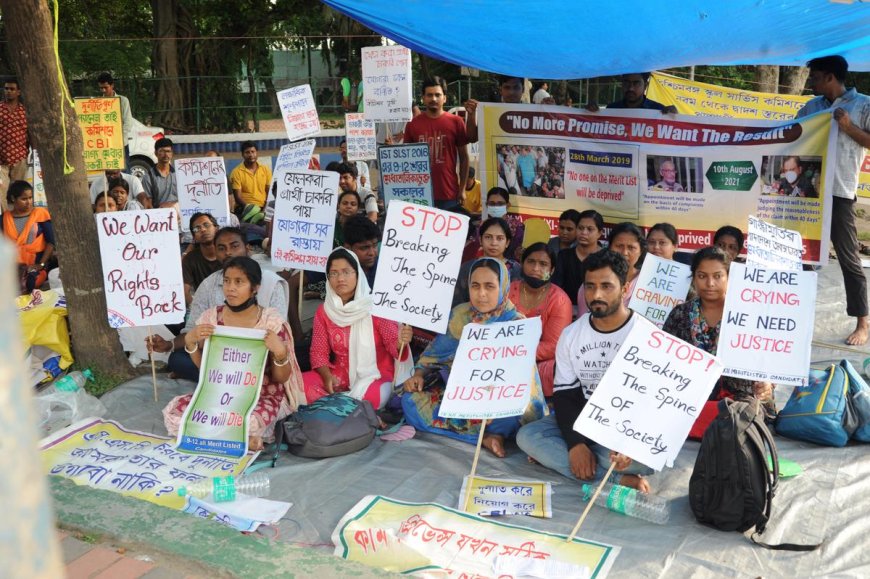West Bengal Teacher Recruitment Controversy: Unpacking the Allegations, Impact, and Way Forward
The West Bengal teacher recruitment controversy has stirred political and social debates across the state. This article examines the origins, allegations, government response, and implications for education policy and governance.

West Bengal is currently witnessing one of its most contentious episodes in the realm of public education—the teacher recruitment controversy. What began as routine hiring for school teachers has rapidly evolved into a storm of accusations, protests, and political confrontations. The controversy is not only testing the administrative processes but also raising critical questions about transparency, meritocracy, and governance in one of India’s largest states.
Background: What Sparked the Controversy?
The West Bengal government, led by the Trinamool Congress (TMC), had announced recruitment for thousands of teachers across state-run schools. The objective was to fill vacant positions in primary and secondary schools, aiming to improve educational outcomes.
However, soon after the recruitment process commenced, allegations surfaced regarding irregularities in the selection procedure. Reports indicated possible influence peddling, manipulation of merit lists, and unfair advantage to certain candidates.
According to a detailed report by The Hindu, whistleblowers claimed that exam answer sheets were leaked and re-evaluations were biased towards preferred candidates.
Political Repercussions and Public Outcry
Opposition’s Response
The controversy has become a major political weapon in West Bengal’s fiercely competitive electoral landscape. The Bharatiya Janata Party (BJP) and the Left Front have strongly condemned the TMC government’s handling of the recruitment, accusing it of promoting nepotism and corruption.
BJP leaders have called for a judicial probe and demanded accountability at the highest levels. They argue that the recruitment scandal undermines the very fabric of the state's education system.
For insights into the political dynamics, refer to Economic Times political coverage.
Protests by Aspirants
Thousands of aspiring teachers, many of whom invested years preparing for these exams, have taken to the streets. Their protests highlight not just individual grievances but also a deep frustration with systemic flaws in public sector recruitment.
Social activists and education experts have joined calls for reform, emphasizing the need to strengthen institutional checks and balances.
Administrative and Governmental Measures
In response to mounting pressure, the West Bengal Education Department has announced several measures:
-
Suspension of the recruitment process pending inquiry
-
Formation of an independent committee to investigate allegations
-
Implementation of stricter digital monitoring and transparency tools in future recruitments
The Chief Minister reiterated the government’s commitment to merit-based recruitment and assured that any wrongdoing would be dealt with firmly.
More on government measures can be found in India Today’s in-depth report.
Broader Implications for Education in West Bengal
The controversy casts a shadow on the broader educational framework in West Bengal. Teachers are the backbone of the education system, and flawed recruitment threatens both quality and public trust.
Experts warn that without significant reforms, such scandals will continue to damage the state’s reputation and hamper educational progress.
See National Institute of Educational Planning and Administration (NIEPA) studies.
Legal Developments and the Way Forward
Multiple petitions have been filed in the Calcutta High Court demanding a thorough probe and remedial action. Legal experts believe that this case will set important precedents about accountability in public sector recruitment.
Meanwhile, civil society groups are advocating for:
-
Transparent online application and evaluation systems
-
Third-party audits for recruitment exams
-
Empowerment of teacher unions and public watchdogs
For ongoing updates on legal proceedings, refer to Live Law coverage on West Bengal.
Conclusion: Restoring Faith in the System
The West Bengal teacher recruitment controversy underscores the vital importance of transparency, fairness, and robust governance in public sector appointments. While the scandal has undoubtedly shaken public confidence, it also offers an opportunity for the government to introduce meaningful reforms.
For lasting impact, it will require not only administrative will but also sustained engagement with educators, aspirants, and civil society. The future of West Bengal’s education system depends on how effectively these challenges are addressed.



















































